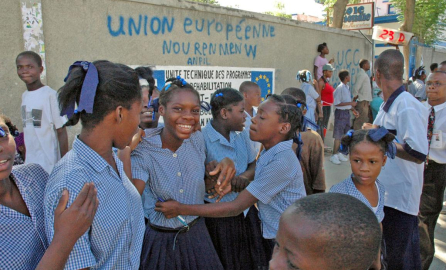The Ebola epidemic has taken many lives, breaking up families and leaving numerous children parentless. But it has also left its mark on the economies of affected countries. In Sierra Leone, it has more or less ‘destroyed’ the economy, disrupting all key sectors including agriculture, mining and tourism. Donor support has been too slow to arrive and has not ‘kept pace’ with the disease, according to Alimamy Bangura, Director of the Economic Policy and Research Unit at Sierra Leone’s Ministry of Finance.
Sierra Leone is a resource rich country, with considerable deposits of iron ore, gold, diamonds, bauxite and rutile as well as valuable fishing grounds. Yet, prior to the epidemic, it was a fragile, low-income country recovering from a civil war that lasted over 10 years and caused 70,000 deaths.
Sierra Leone is a long way from achieving the Millennium Development Goals (MDGs). Nevertheless, the country’s economy was clearly improving with one of the highest growth rates in recent years and with severe poverty significantly reduced since the war.
Sierra Leone has been receiving Budget Support since shortly after the Civil War ended in 2002. It began with bilateral general Budget Support, but since 2006 it has been provided through a coordinated approach among the four main donors* using a common set of performance indicators to disburse funds.
“The challenge before the Ebola crisis was moving [away] from a fragile situation where we support core reforms to support better service delivery,” explained Amparo Gonzalez Diez, the Head of Economic, Trade and Regional Programming Section of the European Delegation to Sierra Leone.
The Ebola crisis has temporarily put a stop to this. It “is just wiping out the small [improvements] that we have made and resurgence since the end of the conflict,” said Mr Bangura.
The Ebola crisis has generated unforeseen emergency costs and loss of revenue for the country resulting in a fiscal deficit of 28 million dollars. Preliminary estimates by the government and the International Monetary Fund (IMF) suggest that this year economic growth will slow down from 11.3% to 4%.
“In the context of Ebola, we find budget support has become now more and more important, because [of] what the Ebola crisis has done. […] The revenue base of the government is now very very narrow,” explained Mr Bangura.
“So Budget Support is [helping] the government to meet their minimum requirements for the functioning of the state and also to meet all the extra needs they have,” added Ms Gonzalez Diez. “This year [2014] the EU is going to provide all in all 23 million euros, which is more or less 4 % of the revenues of the country.” This includes a supplementary special tranche of 12.6 million euros to assist with the financial gap.
Mr Bangura is worried that this is not enough. Asked if Sierra Leone needs more support, he replied: “Oh we need more support from donors. One critical issue about the support that is coming from donors is that it’s now improving but it’s very slow. It did not keep pace with the increase in the intensity of the disease.” He continued by sharing some examples of the challenges the country is facing.
The morning of Mr Bangura’s interview the local radio station was complaining that the country still does not have sufficient treatment or holding centres. While in other countries infection rates are slowing down – and in Nigeria disappeared completely – in Sierra Leone infection rates are continuing to increase. Despite donor support the construction of treatment centres is taking too long and people who may have been infected are not able to move from their houses as there is nowhere to treat them.
Human capital is also a challenge. Prior to the outbreak Sierra Leone was already facing a severe shortage of skills across all sectors, especially medical staff. At the time of the crisis there were 136 doctors operating in Sierra Leone, too few to treat a population of around 6 million people.** “They cannot withstand and Ebola is just worsening the situation. […] Six [Sierra Leonean] doctors have died. A lot of nurses have been infected and died. Yesterday I received a text. As soon as I got home I received another text a seventh doctor has been infected also now with the virus.” This doctor, a 64 year-old dermatologist, later died.
Before the Ebola crisis, the EU was working to improve service delivery by extending dialogue from the Ministry of Finance to also include line ministries. This included a technical assistance programme: “This should really help the government [address] challenges like monitoring of policies and strategic planning at line ministry level,” said Ms Gonzalez Diez. The current situation means that “right now we cannot mobilise consultants on the ground, because people don’t want to go. They are afraid of going. And we have needs to face right now. The government has needs,”
“It’s very important to face the crisis and we need to provide a response for that but it’s also important to remain committed to the commitments we had. And the problem of the Ebola crisis is to forget some of the basic needs the country is also requiring. This demands a strong coordination between donors also with the government.”
The government is trying to maintain the delivery of services at the level it was before the crisis, despite the increasing expenditure caused by Ebola. But according to Mr Bangura, the huge financing gap can only be filled by “external concessional resources, I mean grants like Budget Support resources.” He is worried that “if those resources aren’t available then I’m afraid we’ll go back to a situation of macroeconomic instability, and perhaps not only macroeconomic instability but political and social instability.”
Looking ahead Mr Bangura concluded that the government “need[s] to put social structures in place in order to be able to face such crises in future,” so that they can respond quickly as and when they arise.
* These donors are the:
- European Union (EU)
- United Kingdom’s Department for International Development (DFID)
- World Bank
- and the African Development Bank.
** The World Health Organisation (WHO) has a target of 2.28 physicians, nurses and midwives per 1000 people, but 2010 in Sierra Leone this number was only 0.188, 8% of the target. The WHO estimates that failure to meet this target will result in insufficient coverage of primary healthcare needs.
|
This article is published as part of a Focus on Ebola, which includes interviews with colleagues from the European Commission and its partners. You can find a full list of our coverage here. For more information on the topics addressed in this article you can visit the following groups: |
This collaborative piece was drafted with input from Amparo Gonzalez Diez and Stephan Van Praet at EuropeAid with support from the capacity4dev.eu Coordination Team.
Photo credits: ©EC/ECHO/Cyprien Fabre




Log in with your EU Login account to post or comment on the platform.